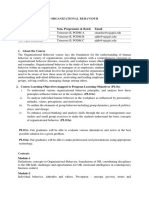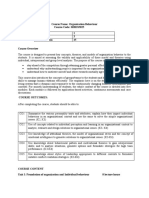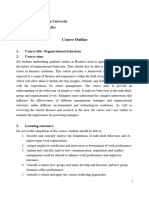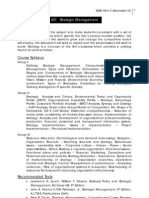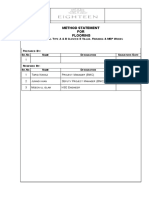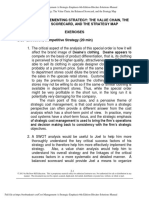Course PGDM Session
Course PGDM Session
Uploaded by
Rakshika ShrivastavaCopyright:
Available Formats
Course PGDM Session
Course PGDM Session
Uploaded by
Rakshika ShrivastavaOriginal Title
Copyright
Available Formats
Share this document
Did you find this document useful?
Is this content inappropriate?
Copyright:
Available Formats
Course PGDM Session
Course PGDM Session
Uploaded by
Rakshika ShrivastavaCopyright:
Available Formats
JAIPURIA INSTITUTE OF MANAGEMENT STUDIES
VASUNDHARA, GHAZIABAD
Course PGDM Session – 2010-12
ORGANIZATIONAL BEHAVIOUR
Subject Code –PG 206
Objective: The objective of the course is to make the students able to understand concepts, theories and
various models, moving from individual behaviour to group behaviour and to Organization as a whole.
Students will be able to anticipate issues and problems in the organization and address the typical
organizational issues in greater confidence. They will appreciate the complexity of organizational
behavior.
Pattern of question paper for final examination
1. The total weight of the end semester examination will be 60 marks.
2. The question paper will be divided into three sections. Section A will have a small case study with
specific questions and it will carry a weight of 20 marks. Section B will consist of 7 short answer
questions with a weight of 4 marks each, out of which candidates are required to attempt any 5 questions
(total 20 marks). Section C will have 2 full length questions (with internal choice) with a weightage of 10
marks each (total 20 marks)
3. The time allotted for attempting the question paper will be 3 hrs.
Total Credit Hours ---------- 4/week
Total Marks (End Term Examination 60, Sessional 40)
Unit 1: Introduction to OB:
The concept and scope of O.B, Contributing Disciplines to the OB field, Models of OB, challenges and
opportunities for OB.
Part 1:
Unit 2: Foundation of Individual Behaviour:
Understanding about Personality, personality determinants, personality traits, theories of personality and
major personality attributes influencing O.B.
Fostering Learning and Reinforcement: Basic understanding of Learning, Theories of Learning-Classical
conditioning, Operant conditioning, and Social learning ,and, Shaping: A Managerial Tool through
Reinforcement.
Perception and Attribution: What and why of Perception, Factors influencing Perception, Perceptual
process, Errors, Impression Management and Attribution theory.
ORGANIZATIONAL BEHAVIOUR PG-0I (3) 2010-2012
JAIPURIA INSTITUTE OF MANAGEMENT STUDIES
VASUNDHARA, GHAZIABAD
Values, Attitude and Job satisfaction: Values at work place, Components and major types of attitudes at
work place, Importance of attitudes to Workplace Diversity. Causes of job satisfaction and measuring Job
satisfaction.
Unit3: Motivation and Work Behaviour:
Understanding motivation, early and contemporary theories of motivation and its application at work
place.
Part II: The Group
Unit 4: Foundation of Group Behaviours at work place.
Group Dynamics : Concept of group, Types of group, reasons of people joining the group, stages of group
development, group structure, group cohesiveness, team as a special type of group, types of teams,
trouble with the team.
Leadership in organizational setting: What is Leadership, Theories of Leadership- Trait, Behavioural and
Contingency theory, Transactional, Charismatic, Authentic, Servant and transformational leadership ,
Level 5 leadership, and, Contemporary issues of leadership.
Power and Politics in the Organization: Definition of Power, Bases and Sources of Power, Power Tactics,
and Power in action.
Unit5:
Conflict and Negotiation: Understanding about conflict, types of conflict and mechanisms to resolve
conflict. Negotiation in Conflict management, Stages and strategies of negotiation.
Decision making in organization: Understanding of decision making, Process of Decision Making and
different techniques of Decision Making.
Part III: The organization System
Unit 6: Foundation of Organization Structure and Culture:
Organizational Structure: Understanding of Organization Structure, Designs of organizations, reason for
differences in structure.
Nature and types of Organizational Culture, process of creation and transmission of culture.
Text Book: Behaviour in Organization by J. Greenberg and Robert A. Barron.
Supplementary Readings :
1. Organizational Behaviour By Stephen P. Robbins,PHI Publication
2. Organizational Behaviour by Mc. Shane and Von Glinow, Tata Mc Graw- Hill
3. Organizational Behaviour by Hellriegel and Slocum, ThomsonSouth west
4. Organizational Behaviour by John W. Newstrom and Keith Davis,Tata Mc Graw- Hill
5. Organizational Behaviour by Fred Luthans, Mc. Graw Hill
6. Managemsent of O.B. by Paul Harsey, Kennith Blan
ORGANIZATIONAL BEHAVIOUR PG-0I (3) 2010-2012
You might also like
- BIR Certificate (Form 2303)Document1 pageBIR Certificate (Form 2303)Kevin TangcayNo ratings yet
- Plate No: EM8635: Official ReceiptDocument1 pagePlate No: EM8635: Official ReceiptRomie Opeda67% (6)
- LRP - Intro. To Agri. Commodity & Enterprise Dev. - AGEC02Document76 pagesLRP - Intro. To Agri. Commodity & Enterprise Dev. - AGEC02Gesabel Impabido100% (3)
- Learning in Action: A Guide to Putting the Learning Organization to WorkFrom EverandLearning in Action: A Guide to Putting the Learning Organization to WorkRating: 3 out of 5 stars3/5 (1)
- AIMA Due Diligence Questionnaire 20160331Document27 pagesAIMA Due Diligence Questionnaire 20160331nyguy06100% (1)
- 6 Polaroid Corporation 1996Document64 pages6 Polaroid Corporation 1996jk kumarNo ratings yet
- FOB SyllabusDocument2 pagesFOB Syllabuspalkintokas02No ratings yet
- BU MBA Syllabus 8Document2 pagesBU MBA Syllabus 8mahesh95176No ratings yet
- Industrial Psychology and Organizational Behavior-SyllabusDocument4 pagesIndustrial Psychology and Organizational Behavior-SyllabusanuradhakampliNo ratings yet
- Name of The Department of Commerce: Principle of Management-IiDocument5 pagesName of The Department of Commerce: Principle of Management-IiPrashant raskarNo ratings yet
- Bmgt103l Organizational-Behavior TH 1.0 71 Bmgt103l 66 AcpDocument2 pagesBmgt103l Organizational-Behavior TH 1.0 71 Bmgt103l 66 Acpasgar sheikhNo ratings yet
- Exact Syllabus Sem 1 NoyorikaDocument13 pagesExact Syllabus Sem 1 NoyorikaNoyorika PrasadNo ratings yet
- Course OutlineDocument6 pagesCourse OutlineMuluken AschaleNo ratings yet
- Internal Examinations 10 Marks Seminars 5 Marks Assignments 5 Marks Attendance/Class Participation 5 Marks Total 25 MarksDocument2 pagesInternal Examinations 10 Marks Seminars 5 Marks Assignments 5 Marks Attendance/Class Participation 5 Marks Total 25 Marksshamini binoyNo ratings yet
- SLM BBA Organisational BehaviourDocument157 pagesSLM BBA Organisational BehaviourAJAY KRISHNAN KNo ratings yet
- Mgt1002 Principles of Management and Organizational Behaviour LT 1.0 1 Mgt1002 Principles of Management and Organizational Behaviour LT 1.0 1 Mgt1002Document2 pagesMgt1002 Principles of Management and Organizational Behaviour LT 1.0 1 Mgt1002 Principles of Management and Organizational Behaviour LT 1.0 1 Mgt1002Aradhana MoteNo ratings yet
- SYLLABUS - Principles of Management and Organizational BehaviourDocument2 pagesSYLLABUS - Principles of Management and Organizational BehaviourRoop KishorNo ratings yet
- Bba 4122 Course OutlineDocument3 pagesBba 4122 Course OutlinelilandakwimbeNo ratings yet
- University of Scholars: Course Title: Organizational BehaviorDocument3 pagesUniversity of Scholars: Course Title: Organizational BehaviorBenazir HitoishiNo ratings yet
- OB Course OutlineDocument6 pagesOB Course OutlinemelkecoopNo ratings yet
- 01 OB - Course PlanDocument8 pages01 OB - Course PlanPAWANNo ratings yet
- OB Course Outline 2022-2023Document5 pagesOB Course Outline 2022-2023Satya Swaroop SwainNo ratings yet
- A Ob SyllubusDocument3 pagesA Ob SyllubusAsres GizawNo ratings yet
- Organisational Behavior OVERALLDocument209 pagesOrganisational Behavior OVERALLRahul BhandariNo ratings yet
- 4594 - 3239 - 153 - 2265 - 87 - Course Outline OB I, Sec A, B - 2013Document5 pages4594 - 3239 - 153 - 2265 - 87 - Course Outline OB I, Sec A, B - 2013saah007No ratings yet
- Fundamentals of Organizational Behavior Bba Bi New CourseDocument2 pagesFundamentals of Organizational Behavior Bba Bi New CourseRojan ShresthaNo ratings yet
- Mpa 213a - Learning Packet - HboDocument11 pagesMpa 213a - Learning Packet - HboEliz Belle HongNo ratings yet
- Course PlanDocument4 pagesCourse PlanSneha Giji SajiNo ratings yet
- Syllabus Mba HR II 17 19Document16 pagesSyllabus Mba HR II 17 19Aayush RathiNo ratings yet
- 1339 Organizational Behaviour: Course AuthorDocument6 pages1339 Organizational Behaviour: Course AuthorShafa AlasgarovaNo ratings yet
- Ob Corrected NotesDocument89 pagesOb Corrected Notesgracektd5No ratings yet
- OMBC102Document3 pagesOMBC102RENUNo ratings yet
- 2-Year MBA SylbsDocument61 pages2-Year MBA SylbsAnkur DhimanNo ratings yet
- Student Course File - ODM (23-25 Batch)Document10 pagesStudent Course File - ODM (23-25 Batch)Kishan T ANo ratings yet
- Course Outline-1Document5 pagesCourse Outline-1Manuel BoahenNo ratings yet
- Course Outline For Organization BehaviourDocument3 pagesCourse Outline For Organization Behaviourchikumbutso chimbatataNo ratings yet
- Organization BehaviourDocument2 pagesOrganization BehaviourRishabh Lamba100% (1)
- Organisational Behavoir Book PDFDocument81 pagesOrganisational Behavoir Book PDFAxmedcarbNo ratings yet
- ORGANIZATIONAL BEHAVIOURjan15ForStudents PDFDocument4 pagesORGANIZATIONAL BEHAVIOURjan15ForStudents PDFSaad RafiqueNo ratings yet
- Syllabus Copy VTU ORGANIZATION CHANGE AND DEVELOPMENT Sub Code - 18MBAHR404Document1 pageSyllabus Copy VTU ORGANIZATION CHANGE AND DEVELOPMENT Sub Code - 18MBAHR404kerthsNo ratings yet
- Course OutlineDocument4 pagesCourse Outlineabu.kakon.241No ratings yet
- Outline OB MGT-306 Fall 24Document6 pagesOutline OB MGT-306 Fall 24ar8609342yNo ratings yet
- Organizational Behaviour by Examining Psychological Theories That Provide Insight Into Human Behaviour at WorkDocument29 pagesOrganizational Behaviour by Examining Psychological Theories That Provide Insight Into Human Behaviour at WorkSumit DubeyNo ratings yet
- Organizational BehaviorDocument5 pagesOrganizational Behavior18 Nguyễn Khánh LinhNo ratings yet
- Review of Book 1, and 2Document11 pagesReview of Book 1, and 2shipra ojhaNo ratings yet
- Hbo OnlineDocument3 pagesHbo OnlineLuanne Jali-JaliNo ratings yet
- Course Name: Organizational Behaviour Course Code: 18JBS107Document3 pagesCourse Name: Organizational Behaviour Course Code: 18JBS107Oasis A2No ratings yet
- Syllabus Organizational Management FinalDocument10 pagesSyllabus Organizational Management Finalcrossfire102No ratings yet
- Organizational Management: by - LT CDR M Sarwar IqbalDocument9 pagesOrganizational Management: by - LT CDR M Sarwar IqbalFuad HasanNo ratings yet
- Course Title Human Behavior in OrganizationDocument15 pagesCourse Title Human Behavior in Organizationmariateresa.badillaNo ratings yet
- Course Outline OB - IBADocument2 pagesCourse Outline OB - IBAicloud58No ratings yet
- Syllabus - Organizational BehaviourDocument2 pagesSyllabus - Organizational BehaviourHIDDEN Life OF 【शैलेष】No ratings yet
- BBA Management IV - 14Document8 pagesBBA Management IV - 14krish bhatiaNo ratings yet
- Bachelor of Science in Management Economics (BSME) : ReferencesDocument5 pagesBachelor of Science in Management Economics (BSME) : ReferencesMyMy MargalloNo ratings yet
- Punjabi University Patiala 4th Sem Syllabus, 2010.Document43 pagesPunjabi University Patiala 4th Sem Syllabus, 2010.Hardeep SharmaNo ratings yet
- Revised OB - Course StructureDocument2 pagesRevised OB - Course StructureAnubha JainNo ratings yet
- Catalog Description - MBDS5025Document3 pagesCatalog Description - MBDS5025Shubham KumarNo ratings yet
- 934 - BA Pt-I Psychology (Semester IDocument8 pages934 - BA Pt-I Psychology (Semester Iabbc5261No ratings yet
- Organizational Theory Course OutlineDocument4 pagesOrganizational Theory Course OutlinemereraeshetuNo ratings yet
- Organisational Behaviour (Prof. Asim Talukdar)Document11 pagesOrganisational Behaviour (Prof. Asim Talukdar)Vaibhav AroraNo ratings yet
- Contemporary Theory and Practice of Organizations, Part II: Leading and Changing the OrganizationFrom EverandContemporary Theory and Practice of Organizations, Part II: Leading and Changing the OrganizationNo ratings yet
- Mindfulness for Better Leadership and Business Performance: An Integration of Heart-Ware Into Business PracticesFrom EverandMindfulness for Better Leadership and Business Performance: An Integration of Heart-Ware Into Business PracticesRating: 5 out of 5 stars5/5 (1)
- HSE-BMS-050 Hazard Identification ProcessDocument30 pagesHSE-BMS-050 Hazard Identification Processnurwinanto01No ratings yet
- Departamento de Matemáticas: Mathematics - 3º E.S.ODocument2 pagesDepartamento de Matemáticas: Mathematics - 3º E.S.OketraNo ratings yet
- Theory Strategic DEFDocument33 pagesTheory Strategic DEFNoa Sanchez FerminNo ratings yet
- Sbca Corp Syllabus Ay2425Document9 pagesSbca Corp Syllabus Ay2425Carmela Luchavez AndesNo ratings yet
- 6 Bhagyashree BramheDocument76 pages6 Bhagyashree BramhePritam Kumar PaulNo ratings yet
- Method Statement FOR Flooring: 10 M - T A&Bc EV - F & Mep WDocument8 pagesMethod Statement FOR Flooring: 10 M - T A&Bc EV - F & Mep WTariq KhattakNo ratings yet
- JD Manager - Mother Hub OperationsDocument2 pagesJD Manager - Mother Hub Operationsdivyadev444555No ratings yet
- Oriflame Annual Report 2015 PDFDocument110 pagesOriflame Annual Report 2015 PDFgermanoteroNo ratings yet
- Syllabus Mapping V2Document3 pagesSyllabus Mapping V2Jino JoseNo ratings yet
- ILO Conectys PO FT-ILO1-11.2022-002 Silvervhil - FacilityDocument1 pageILO Conectys PO FT-ILO1-11.2022-002 Silvervhil - Facilityvilly vencerNo ratings yet
- .NG Index - PHP Get Printout& Report 1&id 88922Document3 pages.NG Index - PHP Get Printout& Report 1&id 88922anasrabiu07038No ratings yet
- Sustainability Report 2020 21Document46 pagesSustainability Report 2020 21Laxmikanta NayakNo ratings yet
- Chapter Seven: Risk Management For Changing Interest Rates: Asset-Liability Management and Duration TechniquesDocument37 pagesChapter Seven: Risk Management For Changing Interest Rates: Asset-Liability Management and Duration TechniquestusedoNo ratings yet
- Entrepreneurship Skills 001Document3 pagesEntrepreneurship Skills 001Epics International CollegeNo ratings yet
- MSC GROUP 11 BIZ PLANDocument32 pagesMSC GROUP 11 BIZ PLANChuwanzi MbohNo ratings yet
- 3 Keys To POS Payback: POS In-Depth SeriesDocument4 pages3 Keys To POS Payback: POS In-Depth SeriesasikohajaNo ratings yet
- East-Westbound Terminal & Public Market: Daily ChecklistDocument4 pagesEast-Westbound Terminal & Public Market: Daily ChecklistEastwest BoundNo ratings yet
- Kogta Financial India LimitedDocument5 pagesKogta Financial India LimitedofficeloginpurposeNo ratings yet
- Construction Project Construction Management Construction Project Management Management ContractingDocument20 pagesConstruction Project Construction Management Construction Project Management Management ContractinghugoNo ratings yet
- REPORTER: Mary Grace Bajao and Aika Kuntawang The Needs For Diagnostic ModelDocument3 pagesREPORTER: Mary Grace Bajao and Aika Kuntawang The Needs For Diagnostic ModelShen CalotesNo ratings yet
- Repetitive Manufacturing - Product Cost CollectorDocument11 pagesRepetitive Manufacturing - Product Cost CollectorKaran KadamNo ratings yet
- 13.product and Process Innovation NewDocument20 pages13.product and Process Innovation Newsetiyawanmuktiwijaya160902No ratings yet
- Logistic & SCM QB TybmsDocument13 pagesLogistic & SCM QB TybmsRinky VekariaNo ratings yet
- Cost Management A Strategic Emphasis 6th Edition Blocher Solutions ManualDocument25 pagesCost Management A Strategic Emphasis 6th Edition Blocher Solutions Manuala108725720No ratings yet
- Investment Economics, Risk and UncertaintyDocument17 pagesInvestment Economics, Risk and UncertaintySEDIMAR SUHAILINo ratings yet



























